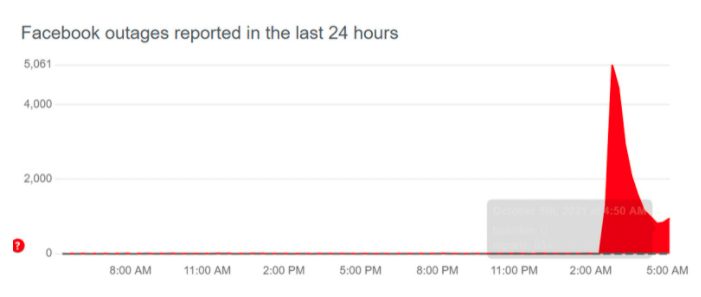Facebook Ecosystem Outage Begs The Question, ‘Time for Decentralised Networks?’

In the early hours of Tuesday, October 5, social media giant Facebook, along with Instagram and instant messaging service WhatsApp, went down due to what it has called a “faulty configuration change”. The massive outages, announced on Twitter, left billions worldwide unable to communicate, and as a result the question on everybody’s lips is: “Is it time for decentralised networks?”
Early on October 5, the outage tracking website Down Detector had logged thousands of reports for all three sites. Facebook would not load at all, while Instagram and WhatsApp were accessible but users could not send messages or load new content.

Facebook Under Fire
A mere two days after US data engineer and Facebook whistleblower Frances Haugen claimed that the social media conglomerate is fully aware of how its platforms are being used to spread misinformation, hate and violence, and has actively tried to hide this evidence, Facebook and its associated platforms went down for approximately six hours. Facebook has denied the claims.
Still, the outcry against Facebook is only adding to the company’s woes. At a US Senate hearing on September 30, Senator Richard Blumenthal hounded global head of safety for Facebook, Antigone Davis, about Facebook-owned Instagram and its potential negative impact on children, specifically young girls and their body image.
The outage and general bad press surrounding Facebook and its founder, Mark Zuckerberg, saw Facebook’s share price drop 4.8 percent and Zuckerberg’s personal fortune lose A$8.11 billion in a matter of hours.
Apparently, No Data Was Compromised
Facebook is citing the root of the problem as a faulty configuration change that was made to the company’s systems. Santosh Janardhan, vice president of infrastructure for Facebook, explained that FB’s engineering teams learned that “configuration changes on the backbone routers that coordinate network traffic between our data centres caused issues that interrupted this communication”.
Janardhan added:
The underlying cause of this outage also impacted many of the internal tools and systems we use in our day-to-day operations, complicating our attempts to quickly diagnose and resolve the problem.
Santosh Janardhan
According to Facebook, there is no evidence that user data was compromised as a result of the downtime.
Concerns Over Control
When seeing the fury and anger that an outage of such a centralised ecosystem can cause, many start to question its value. A lot of criticism is directed at Facebook’s oversight and control.
Earlier this year, the social media giant banned Australian news sites from publishing on Facebook, and the Crypto News Australia page was not immune. The level of control centralised companies such as Facebook can have over society has heightened calls to open up the playing field for decentralised social platforms in the future.
Facebook recently announced it would be investing US$50 million in building a “responsible metaverse”. Advocates of the metaverse, which is a system of shared online spaces for games and social interaction, believe it will help change the nature of work and offer new digital economic opportunities to users across the globe.
All are not convinced of Facebook’s intentions. Many believe such announcements are simply a diversion to deflect heavy criticism about its track record on user privacy and spreading misinformation.
Decentralised Alternatives to WhatsApp
If you, like many others, rely on WhatsApp to facilitate your communication, are concerned about privacy and possibly another outage, there are decentralised alternatives to consider.
Oxen is a comprehensive ecosystem of privacy-focused applications supported by the $OXEN cryptocurrency and backed by Australian not-for-profit Oxen Privacy Tech Foundation.
The company currently offers:
- Session, a private messaging system; and
- Lokinet, an anonymous internet access service.
Session is a free end-to-end encrypted anonymous messaging app that allows users to send messages securely and anonymously. The blockchain-based app is currently used by over 200,000 people in more than 200 countries and is available for both mobile (Android and iOS) and for desktop (Mac, Windows, and Linux).
Lokinet is a low-latency onion router that can be used for private browsing, voice and video calls.






